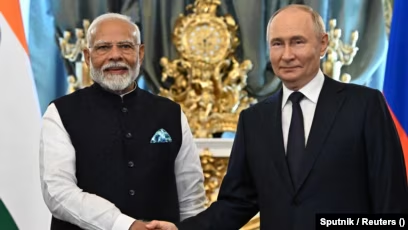Exclusive: Ammunition from India enters Ukraine, raising Russian ire
Ammunition from India Enters Ukraine, Raising Russian Ire
The global geopolitical landscape has recently been marked by heightened tensions due to the entry of Indian ammunition into Ukraine, a development that has significantly agitated Russia. This situation has added another layer of complexity to the ongoing conflict between Russia and Ukraine, and has brought international attention to India’s role in the broader geopolitical arena.
The Context of Ammunition Transfer
The transfer of ammunition from India to Ukraine comes against the backdrop of an intense and protracted conflict between Russia and Ukraine, which began in 2014 and escalated significantly in 2022 with Russia’s full-scale invasion of Ukraine. Ukraine, seeking to bolster its defenses against Russian aggression, has sought military assistance from various countries, including arms and ammunition.
India, traditionally known for its non-aligned foreign policy and historical stance of neutrality, has recently found itself in a complex position with regard to the Ukraine conflict. The transfer of ammunition, which reportedly includes artillery shells and small arms ammunition, signals a notable shift in its foreign policy and has significant implications for international relations.
The Russian Response
Russia’s response to the Indian ammunition entering Ukraine has been one of sharp condemnation and concern. Russian officials have expressed strong objections, labeling the move as an act that could further escalate the conflict and potentially lead to increased hostilities. The Russian government views this development as an unwelcome intervention by a country that has traditionally maintained a stance of neutrality.
Key Points in Russia’s Response:
- Diplomatic Protest:
Russia has lodged formal diplomatic protests against the transfer of Indian ammunition to Ukraine. Russian diplomats have sought to convey their displeasure through official channels, urging India to reconsider its stance and to avoid actions that could contribute to the prolongation of the conflict. - Public Statements:
High-ranking Russian officials and media outlets have condemned the ammunition transfer, framing it as a violation of the principles of neutrality and an escalation of the conflict. Russian state media has criticized India’s involvement, reflecting broader public sentiment and governmental frustration. - Strategic Concerns:
Russia perceives the transfer as a strategic move that could tilt the balance of power in favor of Ukraine. The addition of new ammunition could potentially enhance Ukraine’s military capabilities, further challenging Russian operations and objectives in the region.
India’s Position and Implications
India’s decision to transfer ammunition to Ukraine is a significant departure from its traditional stance of neutrality. Several factors could have influenced this decision:
- Strategic Calculations:
India may have calculated that supporting Ukraine with ammunition aligns with its broader strategic interests or diplomatic considerations. This move could be part of a more nuanced foreign policy approach, balancing relationships with various global powers while addressing regional security dynamics. - Economic and Defense Considerations:
The ammunition transfer could be influenced by economic factors, such as defense industry interests and commercial opportunities. India’s defense industry, which produces a range of military equipment and ammunition, might see the transfer as a means to expand its market and strengthen its global presence. - Geopolitical Dynamics:
The global geopolitical landscape, including shifting alliances and regional security concerns, could also play a role in India’s decision. The move might reflect India’s efforts to navigate complex international relationships and align itself with certain global powers or interests.
International Reactions and Consequences
The entry of Indian ammunition into Ukraine has garnered significant international attention and has sparked diverse reactions from the global community:
- Western Allies:
Many Western allies of Ukraine, including the United States and European Union member states, have welcomed the additional support for Ukraine. They view the ammunition transfer as a positive development that could strengthen Ukraine’s defensive capabilities against Russian aggression. - Neutral and Non-Aligned Nations:
Neutral and non-aligned nations are closely monitoring the situation, assessing the implications for global stability and diplomatic relations. The decision by India, a historically non-aligned power, is being scrutinized for its potential impact on international diplomacy and conflict resolution. - Potential for Escalation:
The situation has raised concerns about the potential for further escalation of the conflict. The ammunition transfer could contribute to a heightened state of tension and a potential increase in military engagements between Russia and Ukraine.
Conclusion
The entry of Indian ammunition into Ukraine has significantly impacted the geopolitical dynamics of the ongoing conflict, drawing sharp reactions from Russia and sparking widespread international attention. India’s decision to provide military support to Ukraine marks a notable shift in its foreign policy and has broader implications for international relations.
As the conflict continues to evolve, the global community will be closely watching the developments and the potential consequences of this intervention. The situation underscores the complex interplay of national interests, strategic calculations, and international diplomacy in addressing one of the most pressing geopolitical crises of our time.

